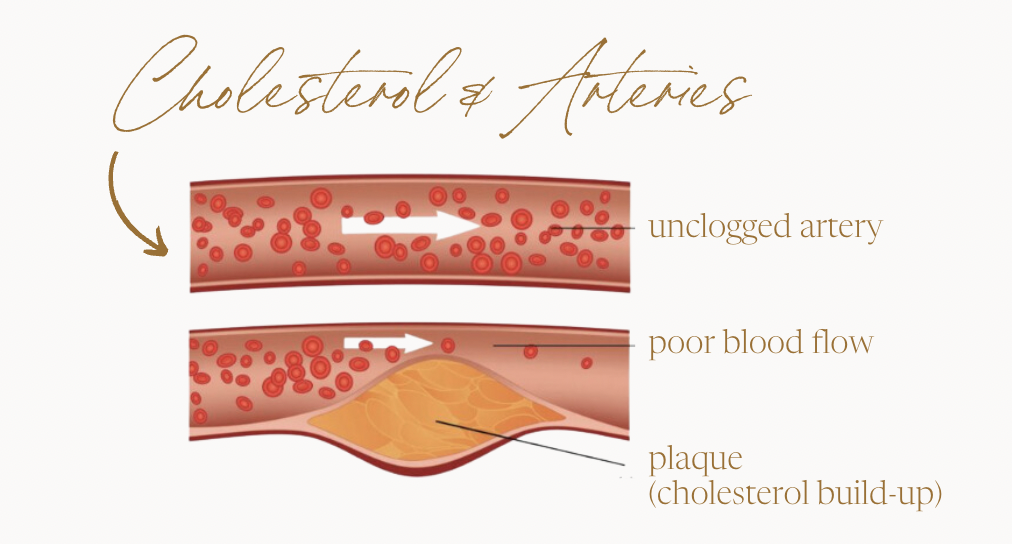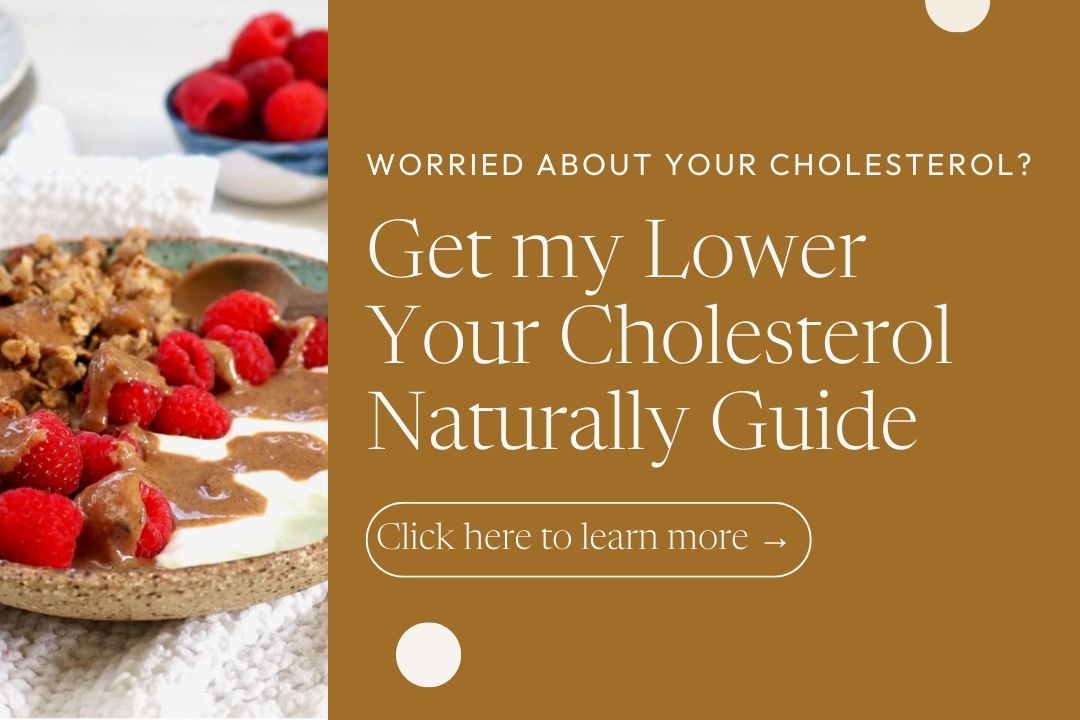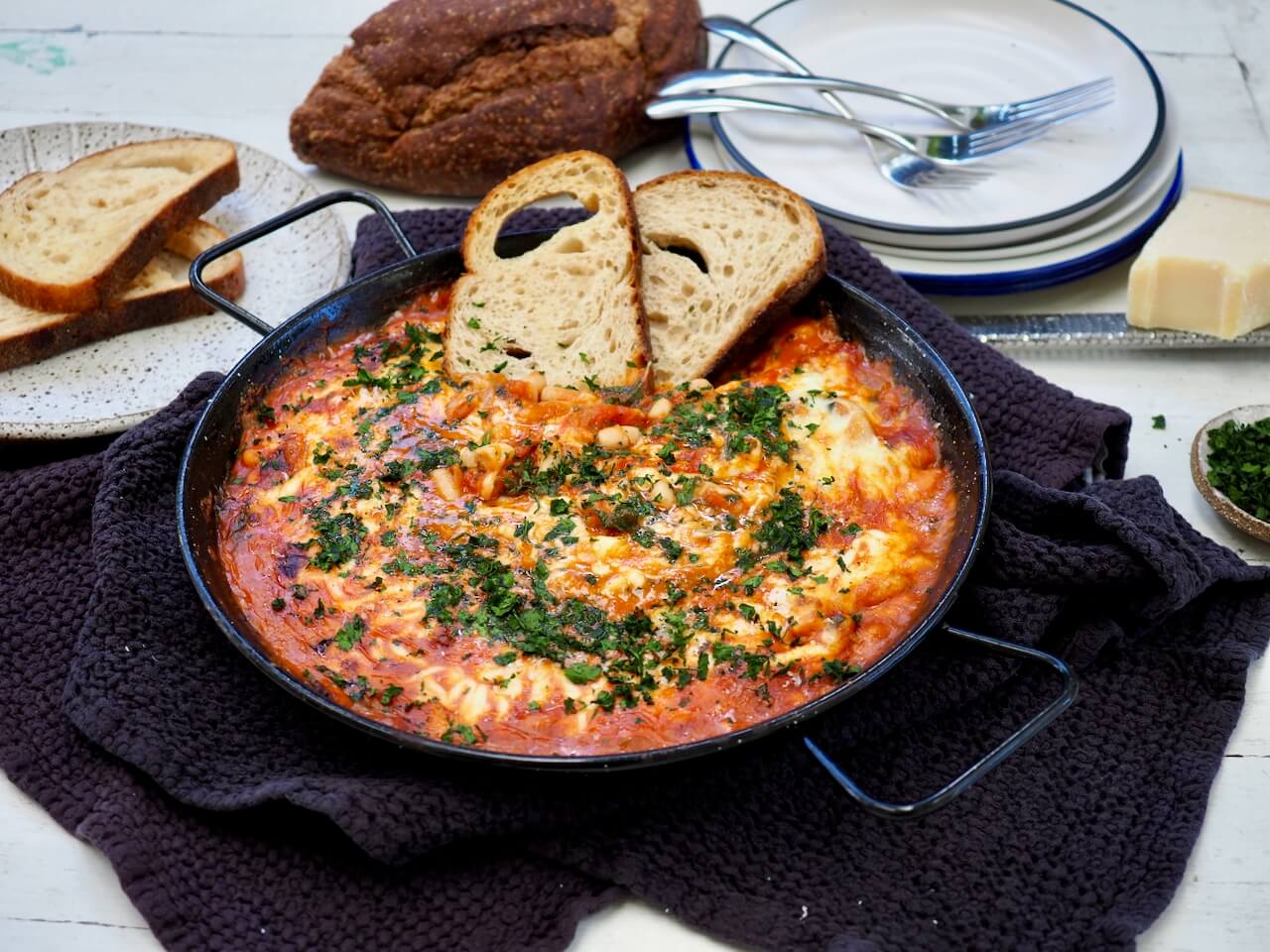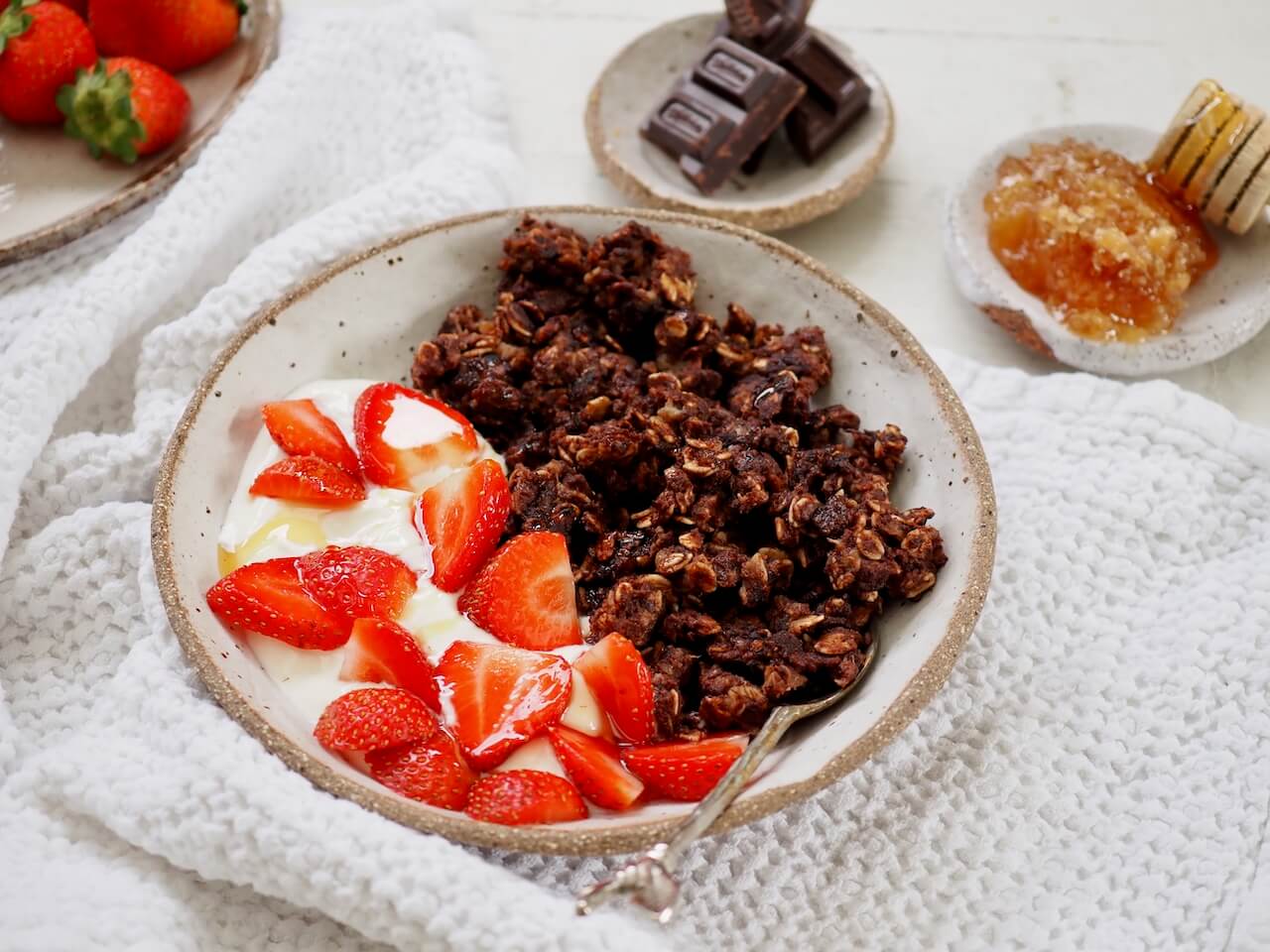Perhaps your doctor said “You need to watch your cholesterol levels!”
It can feel scary or cause you to worry, wondering “What am I allowed to eat to lower my cholesterol levels?!”
Before you go and spend $58,920 dollars on some silly wellness wankery (or rigorous diet plan that you can’t even stick to), I want to help you understand what you actually need to focus – and what to eat.
As a dietitian and nutritionist, with over 13 years of experience, I’ve got diet-free advice to improve your cholesterol levels.
So, grab your cold cup of coffee (you’ve reheated three times) and get ready to learn:
- What (even) is cholesterol?
- What is good versus bad cholesterol?
- Why is cholesterol important?
- How you can lower your cholesterol, without the fuss
What is cholesterol?
I know it’s boring, but let’s get the basics sorted in a few short sentences…

Cholesterol is a waxy substance that floats around in your blood. It plays a very important role. Your body needs some cholesterol to build cells and hormones.
But just like all things in life, balance is crucial.
Too much cholesterol, especially in the wrong places, can lead to health problems *and make your doctor fret*.
That’s because heart disease is no joke. You probably know someone, perhaps even someone very close to you, who lost their life to heart disease. It can be scary to talk about as it’s the biggest disease killer in the world.
Luckily, by making some simple changes to your diet and lifestyle, you can manage your cholesterol levels and keep your heart (doctor and concerned family members) happy.

The Different types of cholesterol
- LDL cholesterol: Think of this as “unhealthy” cholesterol. It can build up in the arteries, forming plaques. This build-up can restrict blood flow and increase the risk of heart disease.
- HDL cholesterol is the “healthy” cholesterol (also starts with an ‘h’) because it helps keep your arteries clear by removing excess cholesterol.
- Triglycerides are another type of fat in your blood. High levels can increase your risk of heart disease.
What are healthy cholesterol levels?
- Total cholesterol should be under 5.5 mmol/L (if no other risk factors are present).
- If you’ve got high blood pressure, heart disease, diabetes or you smoke, LDL cholesterol should be below 2 mmol/L.
- Aim for HDL (Good) Cholesterol that 1.55 mmol/L or higher is better.
- Ideally, triglycerides are less than 1.70 mmol/L is good.
How often should you get your cholesterol checked?
If you’re generally healthy with no risk factors, aim to have your cholesterol checked every 5 years. If you have high cholesterol or other health concerns, your doctor might recommend you get your cholesterol tested more often.
If your recent tests weren’t great and you’ve been advised to ‘improve ‘clean up your diet’ – the good news is it’s totally possible to do this, in a sustainable and doable way.
The BEST food to eat to reduce cholesterol?
When it comes to cholesterol-lowering foods, fibre is under-rated. And hugely helpful.
Fibre is found in foods like grains, fruits, vegetables, legumes, nuts, and seeds. And it’s the part of plants that your body can’t fully digest – which sounds like a bad thing, but it’s actually really good for you!
To lower LDL cholesterol, you want to be getting about 40+ grams of fibre each day. (For perspective, the average grams of fibre consumed is 20g, half the amount you want).
Important tip: Suddenly boosting your fibre intake too quickly isn’t a smart thing to do though. For example, if you’re currently eating around 20 grams and suddenly double it, you might notice unsexy and unpleasant gut symptoms.
So, it’s best to increase your fibre intake gradually. Making the change slowly to crowd in more legumes, vegetables and fruits should be your #1 priority.
The BEST FOODS to lower cholesterol:
- Chickpeas
- Lentils
- Pumpkin seeds
- Chia seeds
- White beans
- Black beans
- Garlic
- Onion
- Wholegrains
- Oats
- Sesame seeds
- Hemp seeds
- Vegetables (with skin on)
- Fruits (with skin on)
If you want to know how to increase your fibre intake to improve your cholesterol levels WITHOUT causing un-fun gut symptoms, then get my Lower Your Cholesterol Levels Naturally Guide.

Legumes are a cholesterol-lowering superfood. Why? They’re loaded with fibre and protein, so they’ll keep you full and satisfied. It’s like a double whammy for your hunger, digestion and cholesterol. Not to mention they also count toward your veggie intake for the day.
Oats are another goodie to add to your cholesterol-lowering grocery list. Oats are high in soluble fibre and contain beta-glucan, which has been found to improve blood sugar control and cholesterol levels.

Healthy fats found in nuts, seeds, avocados, extra virgin olive oil (the extra virgin factor makes a difference) and oily fish are also great news for your heart health. So please, don’t be afraid to add more of these to your diet even if they’re higher in calories.
Now, if you’re wondering..
- Are these the three best foods for lowering cholesterol?
- What is the number one vegetable to lower cholesterol?
- What is the one fruit that fights cholesterol?
Here’s what you need to know…
Diversity is key
There isn’t one specific vegetable you should be eating or top six ‘superfoods’. Instead, focus on crowding a whole bunch of legumes, veggies, fruit (including bananas), whole-grains besides oats (bread isn’t off limits) and nuts (including your favourite nut butter). It’s recommended that you aim to eat 30+ different plant-based foods a week for a healthy gut microbiota, which helps with digestion, immunity and weight management too!
Remember; looking after your heart health isn’t just about lowering your bad LDL cholesterol, it’s about maintaining a healthy range of the ‘good’ HDL cholesterol too.

Now, what foods should you avoid?
You’ve most likely heard these are the worst foods for high cholesterol:
- Commercially baked goods such as cookies, cakes, and pastries made with partially hydrogenated oils
- Fried foods like French fries, doughnuts, and fried chicken cooked in partially hydrogenated oils
- Sugary snacks and desserts
- Sugary beverages like soda and sweetened juices
- Fast food burgers, fries, fried chicken etc
- Frozen meals and microwave dinners that are high in sodium and saturated fats
Here’s what you’re probably not being told about these processed foods…
Yes, eating fewer processed foods like chocolate or chips is beneficial for your heart health. But telling yourself you’re never allowed to eat these foods? Well, that’s not healthy either. Creating lists of forbidden foods is a surefire way to crave them and find yourself overeating them in secret – even if avoiding them would be better for your cholesterol.
Labelling foods ‘off limits’ often increases cravings and makes you feel even more out of control around these very foods you’re trying so hard to avoid. And if you struggle with binge and emotional eating, do my Free 5 Day Course to help you stop binge and emotional eating.
If you want to explore how you can transition from the ‘all-or-nothing’ trap that is perfect eating towards the far more doable approach of a ‘healthy enough’ mindset when it comes to food – check out my ‘Lower Your Cholesterol Naturally Guide’.
You’ll also learn:
- Best habits to prioritise for the biggest results
- How to build balanced meals and snacks (including doable examples) that keep you full and satisfied
- Printable shopping list including the exact products I recommend you get (specific for grocery stores in the Aus, UK, US)
- How to improve your cholesterol levels without obsessing over your weight
And lowering your cholesterol levels will really just be a bonus to the mental clarity, improved digestion, more energy and joy from eating healthily you’ll gain.
‘Cause looking after your heart health shouldn’t suck or feel restrictive.